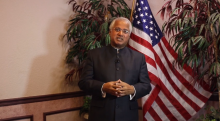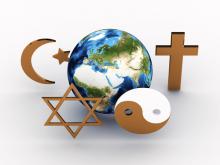Christian-Muslim relations

Three years ago, a nobody from nowhere got famous for doing something unpleasant.
The self-ordained pastor of an unknown Florida church threatened to burn a Quran. And then he did it. And then others with their own intentions picked up the story and used it to inflame Muslims in several nations.
The result: At least 50 people were killed, including seven United Nations employees.
Now that nobody is back, threatening to burn 3,000 Qurans on Wednesday as a “memorial” to the victims of the 9/11 attacks.
You may have noticed I’ve not named the man. That’s not an accident. Publicity is what he wants and I had decided that my small protest against him would be to not contribute to it. While I defend his legal right to do this, nobody needs to add to his spotlight.
And then I heard about a planned counterdemonstration by a Muslim interfaith activist, Mike Ghouse, who’s been plugging away at his cause for years. This year he’s bringing his 10th annual “Unity Day USA” to the same Florida town where the pastor has threatened to burn the Qurans.

When Oklahoma voters overwhelmingly approved a 2010 ballot measure that prohibits state courts from considering Islamic law, or Shariah, the Council of American-Islamic Relations filed a lawsuit within two days challenging the constitutionality of the measure, and won.
But when Oklahoma Gov. Mary Fallin signed a similar measure, one that its sponsor said would forbid Shariah, on April 19 of this year, no legal challenges were mounted.
Why the change?
The biggest difference is that the older bill — and others like it — singled out Islam and Shariah, but also raised concerns that they could affect Catholic canon law or Jewish law. Many early anti-Shariah bills also made references to international or foreign law, which worried businesses that the new bills would undermine contracts and trade with foreign companies.
The new bills, however, are more vague and mention only foreign laws, with no references to Shariah or Islam. They also make specific exceptions for international trade. All of that makes them harder to challenge as a violation of religious freedom.
“These bills don’t have any real-world effect. Their only purpose is to allow people to vilify Islam,” said Corey Saylor, CAIR’s legislative affairs director, of the more recent bills.

I agree with Rev. Wallis — focusing on the common good is a good step toward answering the question of how to be on God's side, and solving many of our nation's greatest points of division. In a country as diverse as ours, however, it can be challenging to know what the common good actually is. As individual participants in society, we all come to the table with different ideological structures for framing our understanding of what is commonly good. Those structures are often built around religion, philosophy, and our beliefs and understandings about existence, mortality, and the cosmos. The situation is exacerbated by the fact that we live in, arguably, the most religiously diverse nation of all time.
Yes, Jesus has called me to love my neighbor as myself, but what does that really mean when my neighbor is Mormon, Muslim, Jewish, Atheist, secular humanist, or Hindu?
Religion is often blamed for the world's greatest conflicts, and rightfully so. One doesn't have to look far to see conflict or violence that is linked to religious motivations or sentiments in some way (think the tragedy at the Boston Marathon or the Sikh man that was murdered shortly after 9/11 because he was wearing a turban). In a country that becomes more religiously diverse every day, it is easy to allow conflict to arise between different religious and non-religious groups. It is true, difference in religious and philosophical ideology can be a cause of great division. But what if I told you it doesn't have to be that way?